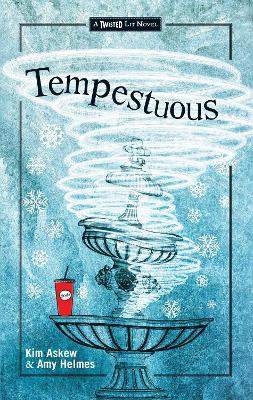Reviewed by Briana @ Pages Unbound on
Review: Tempestuous is a creative and literate interpretation of Shakespeare’s The Tempest that refuses to follow Shakespeare’s plotline exactly but instead takes inspiration from its characters and its themes. There are, of course, great nods to Shakespeare scattered throughout the book, including chapter titles and various quotes. At one point Miranda says of her friend Ariel that she wished “I’d been gifted with the power to make her invisible.” Funny!
Tempestuous hooks the reader from the prologue, opening with a line that promises action and romance: “The handcuffs chafed my wrist, but that was nothing compared with the irritation I felt regarding the cretin to whom I was currently shackled.” The rest of the novel delivers.
Though Askew and Helmes have moved the plot from a magical island to a modern mall, the plot still borders on the insane. Miranda, her friends, and her enemies get snowed in overnight, and hilarious antics ensue. Miranda coordinates a number of crazy plots against her enemies that would border on the absurd in the real world but are quite in keeping with the spirit of the book. Similarly, some of the background information explaining the plot does not always make sense (The other students hate Miranda because they cheated in school? Everyone immediately assumes a thief is the same as a murderer?), but the overreactions are part of the fun and also in the spirit of Shakespeare.
Miranda Prospero is a combination of Miranda and her father Prospero from Shakespeare’s play, imbued with both Prospero’s need to control and penchant for lofty speech and Miranda’s kinder personality. She can be a little difficult for readers to relate to in her arrogance—she has a shallow popular girl attitude going on—but the key is remembering she is supposed to be arrogant because she is based on Prospero. (This also helps explain why everyone around her seems to think she has nearly magical solutions for every problem—something that remains unexplained and could easily confuse a reader unfamiliar with The Tempest.) Miranda stops short of being completely unlikeable, however; the bits of Shakespeare’s Miranda in her redeem her, as does her character arc from aloof private school girl to caring food court coworker.
The love interest, though initially annoying to Miranda, will probably be more immediately endearing to readers. He is smart, witty, creative, and kind. There is no instalove; their romance truly grows. (But isn’t Romeo and Juliet instalove, anyway? So it would be acceptable here!) Best of all, their romance is based on the idea that together, they can help each other to become the best versions of themselves, a message that is important but often overlooked in YA. Askew and Helmes certainly got this right.
I am not a huge fan of The Tempest, and that may have translated into some of my issues with Tempestuous. However, despite my personal exasperation with pompous characters and overstated plotlines, I recognize and appreciate that the authors did a fantastic job translating the themes and feel of The Tempest into a modern YA book. It is not simply an exciting, fast-paced read, but also well-written, and it clearly demonstrates the authors’ love of Shakespeare. I am looking forward to reading more in the serious, particularly retellings of Shakespeare plays I love!
Content Note: Mild cursing and slightly vulgar moments. All in the spirit of Shakespeare, of course!
Note: This review was also posted at Pages Unbound Book Reviews.
Reading updates
- Started reading
- 1 December, 2012: Finished reading
- 1 December, 2012: Reviewed
